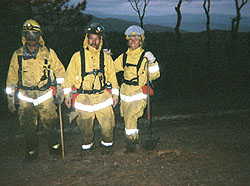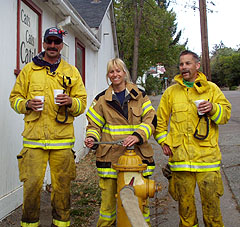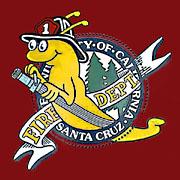|
November 10, 2003
Three UCSC firefighters join battle against historic
conflagration
By Jennifer McNulty
UCSC firefighter Britten Miles has a new pillow. Decorated with colorful
hand-drawn hearts and clouds, it says “Firemen are Earth Angels”
and “Sweet Dreams.”
|

|
| UCSC firefighters Britten Miles
(left), Capt. Don Brookes, and Coleen Canright-Ulrich work on the
Cedar Fire in San Diego County, above. Below, Miles (left), Canright-Ulrich,
and Brookes grab a cup of coffee at the end of their shift in the
town of Julian. They tapped the hydrant to fill the 500-gallon water
tank on their engine before returning to base camp for the night.
|
 |
Donated by a grateful resident of the San Diego area, the pillow seems
to sum up the sentiments of Southern California’s fire victims
following last month’s devastating blazes.
Responding to a call for assistance from state fire officials, the
UCSC Fire Department contributed three firefighters and an engine to
a five-engine “task force” from Santa Cruz County that convoyed
south to the Cedar fire east of San Diego late Monday, October 27.
Fourteen people died and the fire burned more than 280,000 acres before
it was contained. Thousands of firefighters from across the western
United States converged on the conflagration, which destroyed more than
2,200 homes.
Engineer Miles drove the campus’s off-road engine all night with
firefighter Coleen Canright-Ulrich and Capt. Don Brookes to get to the
fire. “No one wants bad things to happen, but if they’re going
to happen, we want to be there to help out,” said Miles.
The Santa Ana winds that had whipped up the fire in its first days
had died down by the time the UCSC team arrived, and Miles, Canright-Ulrich,
and Brookes were assigned to a base camp of 4,000 firefighters in the
city of Santee.
“The ash was so thick, it looked like a gray, drizzly day, but
it smelled like a campfire,” said Miles. “The cars had a layer
of ash on them that looked like a light dusting of snow.”
Protecting homes in the town of Descanso, the team got its share of
smoke and flames. But it was only at base camp that the firefighters
got a sense of how big the fire actually was.
 |
| The banana slug logo on the UCSC fire truck attracted attention
in southern California. |
“There would be 100 fire trucks lined up, and I’d realize
that we’d spent all day working on what was only a small part of
the big picture,” said Miles. “Usually, when you’re fighting
a fire, you see the entire thing. This was different.”
Everywhere they went, residents expressed gratitude. Base camp was
deluged by donations of pillows, socks, toothpaste, and sleeping bags
to help fend off the cold in the mountains, where overnight temperatures
at the end of the week dipped into the 30s.
“People would drive by and honk and wave and give us the thumbs
up,” recalled Brookes. “They were holding signs that said
‘Thank you’ on the street corners, and there were banners
hanging from overpasses. It was everywhere.”
Brookes and Canright-Ulrich opened their lunches one day to find handwritten
notes saying, “You are a shining star,” and “Smile!”
One evening, after an exhausting day of “mopping up” the fire,
the team was headed back to camp when a woman in a passing car flagged
them down. “The driver stopped and yelled ‘Hot food!,’
and I’ve never seen firefighters get out of their trucks so fast,”
said Miles. “She had three big steaming hot lasagnas. It was great.
The people down there were incredible.”
Describing most of their work as “not particularly exciting or
glamorous,” Miles conceded that fighting the fire when it was at
its peak “would’ve been an experience like none other.”
But the opportunity would’ve carried greater risk, and the death
of Novato firefighter Steve Rucker was a painful reminder of that fact.
The UCSC trio had breakfast with Rucker’s crew the day he died,
and the crew heard the Novato team’s calls for help over the radio.
“We heard them calling for a helicopter, and I knew that wasn’t
good,’” said Canright-Ulrich, the team member with the most
experience fighting wildland fires. “Then we heard them call for
two helicopters, and I just thought, ‘Oh, crud.’”
With 12- and 15-year-old sons at home, Canright-Ulrich said the hardest
part of the assignment was missing her boys. “I tell them I train
really hard so I’ll come home to them,” she said. “As
the years go by, you get more comfortable, but it’s always scary.”
No one knew how long the team would be gone when they left town, and
each firefighter called on friends and family to help cover for them.
“My mom, my husband, my ex-husband--everybody just pitches in and
makes it happen,” said Canright-Ulrich, one of only a “handful”
of women firefighters working the Cedar fire.
Returning home November 4 after a week away, Miles found himself in
debt to his roommate and parents for looking after his dogs, both of
whom tangled with a skunk during his absence.
Fire Chief Chuck Hernandez said he felt a sense of pride that was “overwhelming
at times,” knowing that UCSC firefighters were pitching in during
the crisis.
“It reflects the campus’s firm commitment to work with our
fire-service neighbors,” said Hernandez, who credited Tom Vani,
vice chancellor of Business and Administrative Services, with supporting
that goal. “We do a lot of training, but there’s nothing like
real, live experience. You can’t get that from textbooks.”
The Cedar fire marks the second time that UCSC was able to contribute
support to off-campus fires. About two months ago, Capt. Paul Babb and
two firefighters helped fight lightning-caused fires that broke out
in Mendocino County. Everyone in the UCSC Fire Department looks forward
to “joining the bigger family” of firefighters locally and
statewide.
And wherever UCSC firefighters go, the banana slug logo on their trucks
always attracts admirers. “I think we definitely had the most popular
logo,” said Miles.
—
The UCSC Fire Department will send a full engine company to the
November 12 memorial service for fallen firefighter Steve Rucker.
Return to Front Page
|